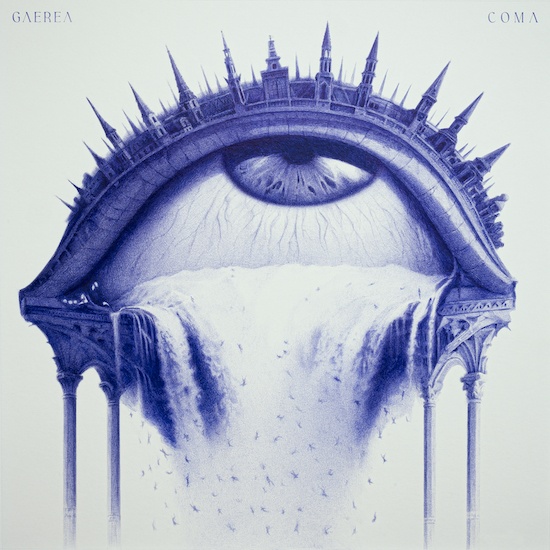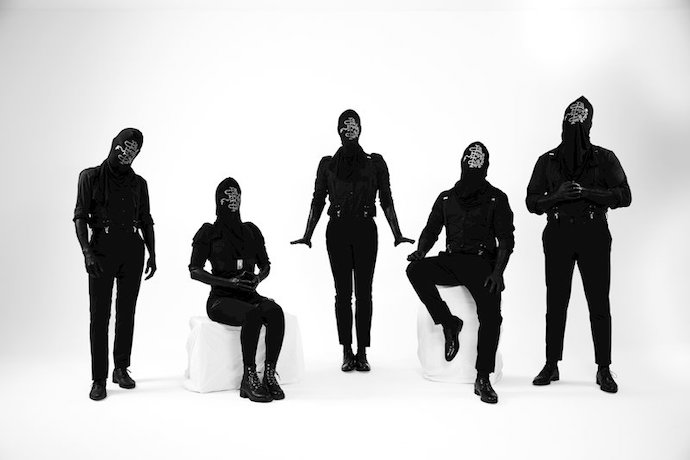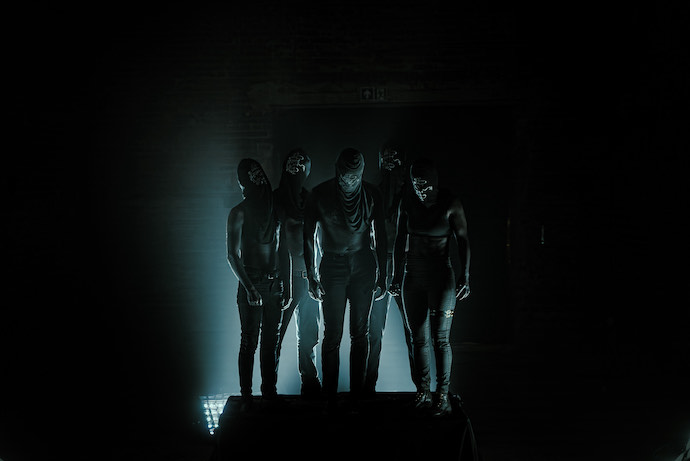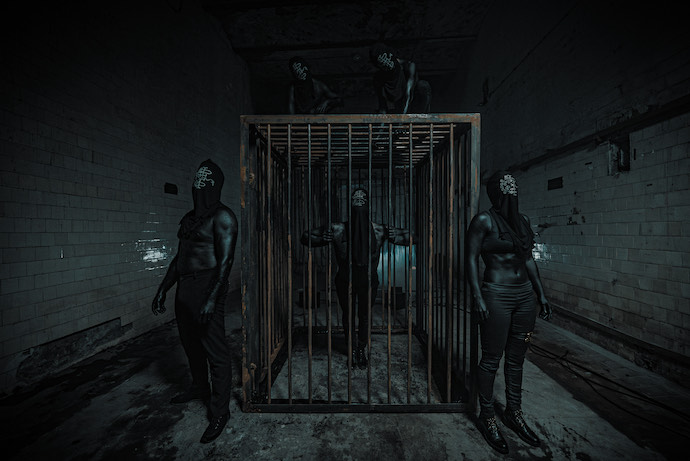
(We present DGR‘s review of the new album by Gaerea, released on October 25th by Season of Mist.)
Portugal’s Gaerea are a smart band. Early on in the group’s inception someone within the band’s lineup recognized the value of both visual aesthetics and theatricality in their music. The group existed as part of a mid-aughts wave of black metal and doom metal groups that quickly took to the anonymization of masks and robes – so that even though the band could claim that the focus was to be put more on the music, you were more than likely drawn to the visual spectacle as well.
Gaerea have been perfectly positioned to both react to and become part of current trends within the heavy metal sphere. You could say there’s luck involved but many of their movements have been remarkably shrewd as well. They could be treated from an “every second tells a story” perspective, as both musically and visually there is always some sort of bombastic movement happening, the hand dancing and wild contortions befitting a Microsoft Kinect Game slowly evolving to hold just as much importance as the music itself.
And, while many bands can and have gotten by on just sheer spectacle and imagery – and have done so fairly well – it helps that Gaerea‘s music has long matched the lunatic puppetry taking place onstage.

Gaerea have been hard to define; their usage of the unholy collective of black metal riffing has seen them categorically described as such, and the band themselves have clearly taken to the genre’s taste – not that they would ever own up to it – for dramatic overture and operatic spectacle. Were they not part of the intricately designed mask crowd, Gaerea could have – for a few years at least – likely soared by just as well with some robustly designed face paint. Though that sort of thing doesn’t lend itself as well to videos, like the group’s listening session for Limbo, wherein the band sat completely still – or attempted to, because the rhythm section quickly sells itself out – while the music played.
Yet Gaerea’s taste for long-form writing and melodicism could just as easily have the band hovering in post-metal and a more extremely flavored melodic death metal realm. Embracing a manic hysteria as their modus operandi, Gaerea’s music is oft-described as purpose-built for passionate catharsis. They have evolved into that style as well. With their self-titled EP spilling into Unsettling Whispers, leading to Limbo, then barreling to Mirage, it has felt like a natural progression for the band. Each time, proving themselves as being worthy more and more.
Mirage felt like the grand conclusion of that, an album long built towards and finally realizing their full potential. Enough steam built up behind the band to launch them through the ceiling. Apparently Gaerea felt the same way, with a period of rapid lineup changes to follow that would ultimately lead to one of the more drastic shifts in the group’s sound – the changing of the voice.

The thing about anonymity is that humans are always going to look for something to identify with. With the voice being one of the most distinct things a person could latch onto, any change there is going to feel seismic. You could argue, of course, that a more important change would be any movement on the songwriter front, but the thing to keep in mind is that to many people there is a reasoning that they could tone-chase and bend any instrument to sound like the one that came before. The voice offers infinite possibilities and very few are likely to sound the same, unless you’re in the TikTok arms race that has become the deathcore vocal Olympics event.
So when you change from someone as distinctive as the gentleman behind the mask and microphone for their first few albums, people are going to notice. They’ve attached themselves to that particular brand of outwardly explosive expression. Likewise, a shift that big is going to do something to the overall sound, with music now written to match the new ship captain rather than asking them to stand up there in cheap pastiche of the one who had occupied the spot before.
Which is how we land drunkenly careening face-first into the door of Gaerea‘s newest album Coma.

Coma both continues the trend of naturally progressing forward for Gaerea and also conveniently side-stepping onto a parallel path. We like to imagine a successful artist’s career being a sequence of straightforward leaps down a singular path – but it is rarely ever that simple. Often, and much like Gaerea’s music, there are winding turns and deviations, decisions made to launch headlong into a tornado just to see where it tosses you out at the other end.
It wasn’t until Mirage that it seemed like the band were making use of the musical forge and really hammering down on what was working for them. They sharpened a lot of their edge in that album as well as shed a lot of the musical fat, so to speak. The songs weren’t nearly as long as their predecessors, broken down into slightly more digestible chunks, yet still remaining just as viscerally intense.
In that way, Gaerea’s Coma continues the forward progression for the band. Seeing songs broken up into smaller pieces and a few of them in the four-minute range seems almost counterintuitive to what the band are, yet they’re a different group here than they were just one album prior.
That’s where the side-jump comes in.

There’s much more running through Coma than has been evident in previous releases. Gaerea really cemented themselves among the more artistically minded black metal crowd, and now with Coma the group shift their vision elsewhere. Coma employs enough post-rock, melodic black metal, post-metal, and even some slight -core influence that you could throw darts throughout the disc and see the band landing anywhere from Harakiri For The Sky to Svalbard. They run a musical gauntlet on Coma and in some ways the disc feels like a handful of different approaches to the Gaerea sound all being tried out just to see what musical tree grows next.
Albums like Coma are career-shifting within an artist’s catalogue, and it is one within this new generation of Gaerea that could promise a handful of different things.
Albums like Coma hold an odd mystique, as they’re partly transitional, partly forward-looking, and partly a seeming attempt to become more of a cultural force. Split across three different pathways, Coma is going to offer up varying degrees of appeal. You can already sense that Coma is the album that Gaerea are going to use to springboard forward, with Mirage and Limbo having laid much of the groundwork beforehand. Gaerea are free to experiment, modernize, and even mainstream their sound a little bit and they’re not the only ones doing so this year. Perhaps part of the fascination with a release like this is experiencing the moment in which the artist takes the leap onward?
It’s a challenge not to think about Coma in such a way given that the opening impression people are going to have of this album is not the pre-release singles “Hope Shatters” or “World Ablaze” – both of which are strong tracks but play it very close to the chest for the band – but a pensive and clean-sung opening in “The Poet’s Ballet”, a dynamic song that deftly avoids feeling like an intro song being stapled to a different track entirely. In spite of the sudden stop and shift into full distortion, the song manages to grow naturally.

What does start to present itself throughout Coma is that a grouping of songs follows a similar blueprint, stacking blocks and blocks on top of each other, piling on the intensity to build toward what one would assume would be an eventual cathartic moment only to have the song just suddenly end. There’s no release, no fade, just one final conflagration and a sudden stop.
In fact, the first half of the album has a handful of these where it seems like Gaerea are steadily strapping rockets to themselves and ramping up events only to face a sudden cut, that final shock serving as their signature emotive end. What is interesting is that while this is happening you can start to get a sense of the machinery ticking over, and even get a glimpse as a simpler verse-chorus-verse-chorus-bridge-chorus-out formula starts to weave itself into the maelstrom. It may be that, because of this, people will appraise Coma as being the group’s most approachable album yet.
Yet that does not translate to a sizable dip in quality. Coma is likely an album that has a few songs that won’t quite land with people quite like previous albums did, as Gaerea are trying new things – but all of those experiments, as light as they are, are put through Gaerea‘s filter so that they are still as theatrical as ever. Many of the songs on Coma still have massive peaks and dips in them dynamics-wise, and there is an honest attempt throughout the album to make it so that the music is not 100% all of the time and at every turn. Perhaps this is why there’s a decent spread of moments throughout Coma wherein it’s just a quiet guitar and a soft-sung section before launching back into the overall explosiveness. You’d be surprised just how easily those bits can get caught in your head as well.

The biggest knock one could drag out against Coma is that it does settle into a groove for its back half and just somewhat tails off. For all of its promise of newer pathways being charted and different influences being shunted past the event horizon to be filtered through Gaerea‘s overall formula, the finality of Coma is a collective of songs that are recognizable largely as… pretty good Gaerea songs.
Some of the opening tropes that color the first half of the album come back and around, and “Kingdom Of Thorns” purposefully fades so that it can wrap back around into the opener of Coma again, creating an interesting listening loop, yet “Shapeshifter” and its indulgent running time in comparison to the rest of Coma – the second song to sail past the six-minute mark and a throwback of sorts to Gaerea‘s longer ambitions – and “Unknown” may wind up fading in part because they don’t immediately strike with the same ferocity as much of the early part of Coma does.
It’s a bizarre thought, but a grouping of Coma is built around a sense of unnerving “suddenness”; this grouping of songs suddenly ends or bursts into form and partially moves by on the strength of musical spectacle as much as a strong core songwriting segment. Yet being just part of an overall movement does make Coma feel somewhat tentative, Gaerea dipping their toes in the pool of different charted spheres just to see what fully lands. It’s definitely dramatic, but not something that feels as if there’s a surprise around every corner.

It is a testament to Gaerea, then, that Coma is as thought-provoking an album as it is. You could view it as a collection of singles, or touch base with the visual aspect of the band and walk away fairly pleased, yet it is also an album that offers much promise and allows for prognostication on where Gaerea might be headed. It is the sort of album Gaerea could use as a springboard, choosing two or three larger elements to take along with them, and releasing two-to-three more albums from there before closing out this particular artistic trilogy and re-evaluating themselves again.
Coma is among Gaerea‘s shorter releases, suggesting a sense of digestibility focused on smaller and individualized events versus one grand, sweeping event. You can always sense that an album is going to be an experience on its own when you’re just as interested in the historical appraisal of a disc down the road to see what songs really stuck with people, and Coma is one of those releases. It offers a multitude of launching points from Gaerea and it is concrete-solid on one point: whichever one they fully choose to embrace and run with, Gaerea are going to do immensely well with it.
https://orcd.co/gaereacoma
https://www.gaerea.com/
https://www.facebook.com/gaerea
https://instagram.com/gaerea_
